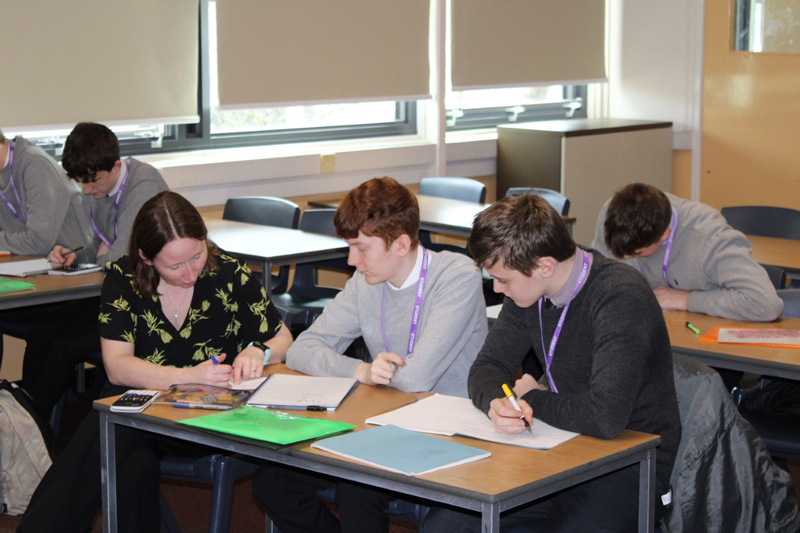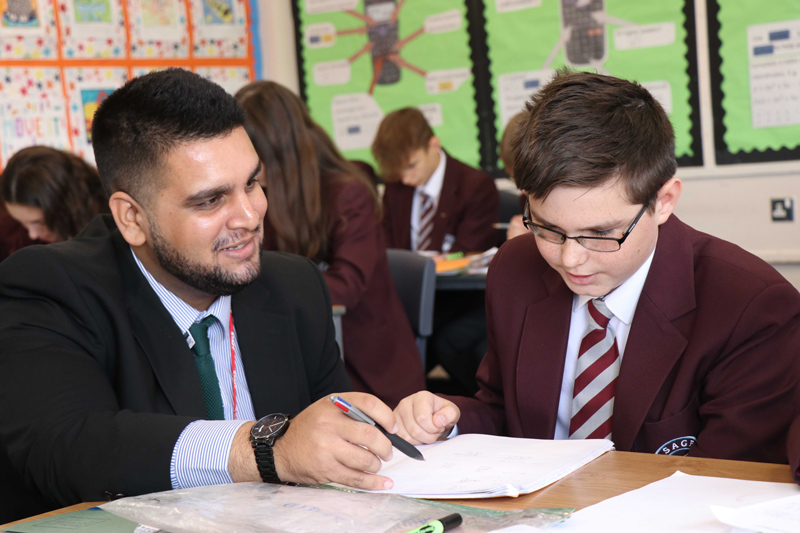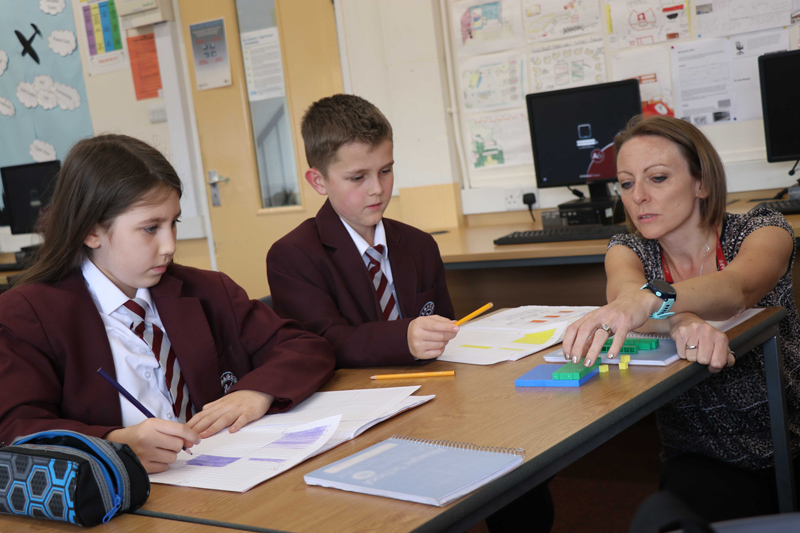“Nature is written in mathematical language.” – Galileo Galilei
Patterns appear in so much of what we see around us. As humans we seem to be attracted to these patterns and have developed mathematics to explain all that we observe. Whether it is studying the geometry of a snowflake, explaining how the stock market reacts to global events or making music that appeals to our ears, mathematics underpins so much of our world.
At Alsager we challenge students to gain a deep lasting understanding of mathematics. In Key Stage 3 we follow a teaching for mastery curriculum. Rather than merely learning procedures we encourage students to share their ideas and develop the rules we use. We use a variety of methods to learn including lots of hands on activities. Students feel safe to make mistakes and reflect on these to gain a greater understanding. We challenge learners to question why they follow certain mathematical rules and to apply these rules to solve complex problems.
Our focus on reasoning and problem solving continues into Key Stage 4 giving students the skills they need to think critically about the problems they encounter as young adults in their chosen careers. In Key Stage 5 we offer A level Mathematics and Further Mathematics. Within these subjects, students study pure mathematics alongside statistics and mechanics.
I love teaching Mathematics because it gives students so many of the essential skills they will need in their life. Many students will go on to work in fields relying on maths, but all students will also use lots of what they have learned in everyday situations like choosing how to organize their personal finances or thinking critically about the statistics they read in the media. I also love to see the passion so many of our students have for maths. Our students are willing to try a difficult problem where the method is not immediately obvious, and I enjoy sharing the sense of achievement they feel when they have explained their solution clearly.
Mr Askew (Teacher of Mathematics)
What does it mean to be a mathematician?
It is challenging but ultimately rewarding, as while a complex equation or question can seem initially daunting, there is great satisfaction to finally working your way through to the correct answer, it’s all about that aha! Moment when you work out the solution. To be a mathematician requires the ability to decompose an initially complex problem into more manageable and comprehendible chunks. Unlike many other subjects, each question is unique in the precise details but often similar in nature and calling upon a familiar skillset; however, the most difficult part of maths is working out the techniques and skills that you need to apply in order to properly work to a solution. Most mathematicians can start with the same problem and reach the same final answer, but using completely different methods and so being a mathematician involves being clear in your working, thinking through a problem in logical stages and making sure your thoughts and small workings-out are documented down so you, a friend or an examiner can quickly trace back the steps you have taken to identify any mistakes easily. (Year 13 student)
To be a mathematician, you need to be resilient and a thinker. You need perseverance and good problem-solving skills. It means to be able to face problems and thinking about them in a three-dimensional way. (Year 11 student)
We use our imagination and mathematical thinking skills to analyse and breakdown problems before solving them. (Year 10 student)
It means to think differently and creatively, while respecting other methods and ways (Year 10).
What skills have you gained in Maths?
Two skills that have improved for me exponentially while doing A level maths are problem solving and resilience. This is because throughout the course there was a constant requirement to decipher key information from long questions and the challenge of learning a plethora of new, difficult skills definitely improved and tested my resilience. Problem solving is a really useful skill to have because it can be used in many different situations. Developing my problem solving skills really helped me with all aspects of my studies, by allowing me to draw upon certain parts of my knowledge as and when I needed to. The ability to think logically goes hand in hand with problem solving and is something that’s taught throughout GCSE and A-level. (Year 13 student)
As mathematicians, we are constantly learning new skills and concepts. We also learn to connect different topics like Numbers, Algebra and Statistics and how well they all fit together. (Year 9 student)
We develop appreciation of learning new methods and practicing them in class which is a safe space to learn for us. (Year 9 student)
I have gained confidence in facing challenges and problems. I am not afraid to try and if I get it wrong, I can try again. I am more resilient now. (Year 10 student)
How are you challenged in Maths?
You are challenged in maths by the perpetual demand to learn new skills and equation and to apply these to questions and problems as part of your independent study. You are continuously encouraged to try different ways of working, or to tackle a problem using multiple techniques with the aim of getting the same answer. The answering of proofs in mathematics is especially challenging since it requires you to articulate the methods you are using in a coherent way so that others could understand the thought process you’ve taken. (Year 13 student)
There is often extension to go onto that makes you think differently and challenges you. (Year 9 student)
Sometimes we discover and explore our own way through maths, and I really enjoy that. (Year 8 student)
We do these maths challenges sometimes that are tough but fun. When there is timed work as well, it helps us to think under pressure. (Year 8 student)

How do we make you enthusiastic about Maths?
Alsager makes you enthusiastic about maths by ensuring you know the practical applications of your study while also creating a supportive and ambitious environment which encourages you to challenge yourself with the hardest questions in order to further yourself as a Mathematician. The specific focus of learning by mastery is incredibly important since developing your all round understanding of a skill makes it so much easier to apply to new scenarios. Techniques such as undoing a solution, filling in the gaps in a method or creating problems for your peers is not only fun but also very stimulating in allowing you to quickly patch holes in your own working. (Year 13 student)
Our teachers are very enthusiastic about maths and we can’t help but feel excited too. (Year 8 student)
Being praised for thinking mathematically and being creative makes us feel proud and excited about maths. (Year 9 student)
A supportive teacher alongside a positive attitude before starting a question. (Year 7 student)
Changing the format of the lesson from time to time e.g. tiles, booklets, group exercises and games. (Year 8 student)
Putting maths in real life situations and involving food into the problems. (Year student 7)









